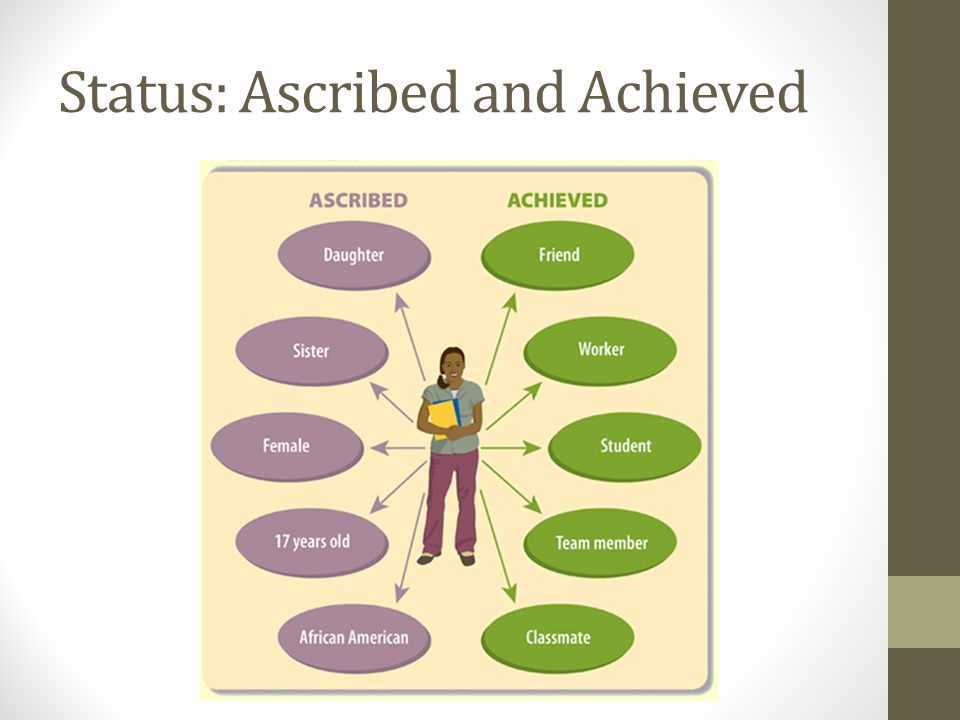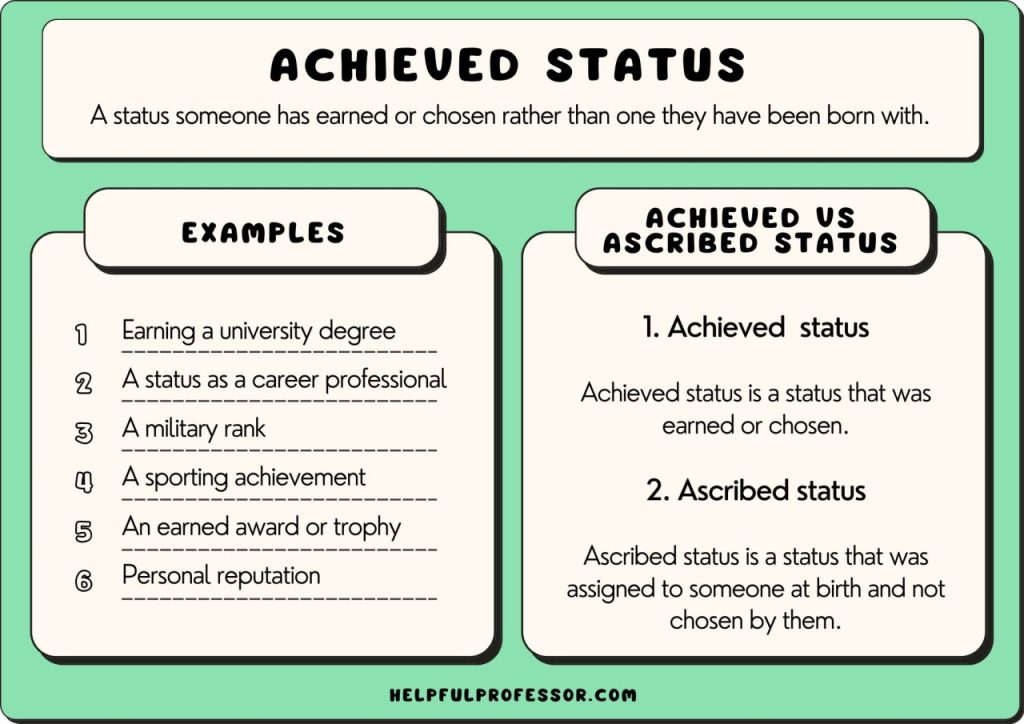Have you ever wondered why some people seem to have it easier than others? Why certain doors open effortlessly for some, while others struggle to even get a foot in? It’s a question that has plagued philosophers and sociologists for centuries, and the answer lies, in part, in the concept of ascribed status. Imagine a child born into a royal family, destined for a life of privilege and power. Or a young woman growing up in a remote village, facing limited opportunities and expectations. This is the power of ascribed status – a social position we are born into, influencing our life journey in ways we might barely comprehend.

Image: k12.libretexts.org
Ascribed status refers to the social positions we inherit at birth, based on factors beyond our control like race, gender, caste, family background, or even nationality. Unlike achieved status, which we earn through our efforts and achievements, ascribed status is essentially a predetermined social label that shapes our experiences and opportunities. It’s the invisible hand of society, guiding us towards certain paths while limiting access to others.
A Journey Through Time: Understanding the Roots of Ascribed Status
The concept of ascribed status has existed for as long as humans have lived in societies. In ancient civilizations, birthright dictated everything from social standing to inheritance. For example, in ancient Egypt, your position in the social hierarchy was directly linked to your lineage, with pharaohs ruling supreme and farmers tending the land. This rigid system, based on ascribed status, defined the lives of Egyptians for centuries.
In medieval Europe, the feudal system provided another compelling example of ascribed status. Peasants were born into servitude, bound to the land and serving their noble lords. This division of society, based on birthright, shaped the social fabric of Europe for centuries. While the concept of ascribed status might seem archaic, its influence still lingers in modern societies, though perhaps in more subtle forms.
The Modern Face of Ascribed Status: A Complex Web of Influence
While feudalism and strict caste systems are largely a thing of the past, the impact of ascribed status persists in contemporary societies. It manifests in subtler ways, often disguised within the fabric of social norms, cultural expectations, and even legal frameworks. Consider the following examples:
Gender as a Defining Factor
Gender, a fundamental aspect of our identity, is often a primary driver of ascribed status. In many cultures, traditional gender roles still dictate expectations for men and women, shaping their access to education, employment, and even political participation. Societal biases often lead to inequalities in opportunities, with stereotypes dictating what professions are deemed suitable for each gender.

Image: helpfulprofessor.com
Race and the Unequal Playing Field
Race, another aspect of ascribed status, carries a heavy weight in many societies. Centuries of systemic racism have created a legacy of inequality, leading to disparities in wealth, education, and healthcare. The color of one’s skin can affect access to opportunities, influence perceptions of competence and trustworthiness, and even impact experiences with law enforcement.
The Weight of Wealth and Lineage
Socioeconomic background, often tied to family wealth and lineage, serves as another powerful form of ascribed status. A child born into a wealthy family inherits not only financial resources but also access to networks, connections, and social capital that can significantly influence their life trajectory. Conversely, individuals from underprivileged backgrounds face barriers to opportunities, often burdened by financial constraints and lack of access to resources.
Nationality and the Global Divide
Nationality, a defining aspect of our identity, also carries significant influence as an ascribed status. Certain nationalities often hold privileges in globalized societies, granting access to better education, healthcare, and employment opportunities. Conversely, individuals from less privileged nations may face discrimination and limited access to resources, struggling to overcome the limitations associated with their place of origin.
Navigating the Labyrinth of Ascribed Status
The concept of ascribed status paints a complex picture of how societies are structured and how opportunities are distributed. It underscores the inherent inequalities that persist within our social systems, highlighting the need for conscious efforts to address these disparities. By recognizing the profound impact of ascribed status, we can:
-
Promote Fairness and Equity – By advocating for policies and institutions that ensure equal opportunities for all, regardless of their ascribed characteristics.
-
Challenge Stereotypes and Biases – By actively confronting prejudiced beliefs and working to dismantle systems of discrimination that perpetuate inequality.
-
Empower Individuals – By supporting initiatives that provide access to education, resources, and opportunities to individuals from marginalized backgrounds, enabling them to overcome the limitations imposed by ascribed status.
-
Foster Social Mobility – By creating systems that foster upward mobility, enabling individuals to break free from the confines of their ascribed status and achieve their full potential.
Example Of Ascribed Status
Beyond Ascribed Status: A Call for Action
The concept of ascribed status serves as a stark reminder that our social systems are not always fair or equitable. While we may not be able to choose our birthright, we can choose to act in ways that challenge existing inequalities and build a more just and inclusive society.
By understanding the complex interplay of ascribed status and its impact on individuals and communities, we can make a conscious effort to break down barriers, create opportunities, and advocate for a world where everyone has a fair chance at success, regardless of their starting point. It’s a journey that requires collective effort, empathy, and a deep commitment to creating a society that truly values human potential.






